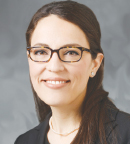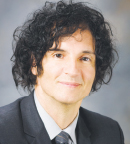Contemporary triple-modality therapy achieves excellent locoregional tumor control of inflammatory breast cancer, with only 4 locoregional recurrences out of 114 patients treated at The University of Texas MD Anderson Cancer Center, Houston. The investigators described their approach at the American Society of Breast Surgeons Annual Meeting.1
Inflammatory breast cancer, which represents 1% to 2% of all breast cancers, is often diagnosed at an advanced stage and progresses rapidly.

Kelly Rosso, MD
“Aggressive surgical resection to achieve negative margins, along with neoadjuvant chemotherapy and with postmastectomy radiotherapy specific to inflammatory breast cancer, decreases the risk of locoregional recurrence and improves quality of life, which is especially relevant to patients with large, fungating masses,” said Kelly Rosso, MD, a breast surgical oncology fellow at MD Anderson Cancer Center.
Their chemotherapy backbone is anthracycline- and taxane-based. HER2-positive patients usually receive dual HER2-targeted therapy. Radiotherapy is usually delivered at 60 to 66 Gy in a hyperfractionated, dose-escalated fashion, individualized to the patient.
‘Shift in Thinking’

Anthony Lucci, MD
Anthony Lucci, MD, Professor of Surgery at MD Anderson Cancer Center and the study’s senior author, emphasized the relevance of their findings. “We frequently see patients with inflammatory breast carcinoma who are being told, ‘There is no reason to remove the primary,’ or ‘You are not a candidate for mastectomy.’ In our study, using an aggressive approach to resection of the primary, we were successful 99% of the time in achieving negative margins by performing a modified radical mastectomy after neoadjuvant chemotherapy,” he said in an interview.
“The patients then completed their trimodal therapy by undergoing postmastectomy radiation therapy specific to inflammatory breast carcinoma, resulting in local recurrence rates that were no different from patients with other forms of breast cancer,” Dr. -Lucci said. “This represents a significant improvement in previously reported local recurrence rates in this disease.”
Dr. Rosso added that the surgeons closely examine the pretreatment photos to better appreciate the degree of diffuse skin involvement. “We don’t spare much skin. We take everything off the muscle and include the muscle when it is involved,” she said. In most cases, primary wound closure is possible; in about 15% of cases, the wound requires a tissue flap by a plastic surgeon.
“We feel this represents a shift in thinking regarding the management of patients with inflammatory breast cancer,” Dr. Lucci offered. “That is, it debunks the outdated thinking that ‘There is no good reason to aggressively resect all of the local disease to negative margins in patients with inflammatory breast cancer, since the thinking is that they might have a distant recurrence, and local control is not that important.’”
Good Outcomes
Dr. Rosso presented findings on 114 patients with stage III inflammatory breast cancer treated at the cancer center between 2007 and 2016. Patients received neoadjuvant chemotherapy, mastectomy, and postsurgical radiotherapy—the recommended approach for non-metastatic inflammatory breast cancer confined to the breast area.
On posttreatment pathology reports, 113 patients (99%) had clear margins, with no disease remaining at the mastectomy tissue edges. Four women (3.5%) had close margins (tumor < 2 mm), and one (0.88%) had positive final margins with tumor at the surgical edge. This particular patient had a recurrence in the axillary lymph nodes. No patient with close margins experienced a recurrence.
Multimodal Therapy for Inflammatory Breast Cancer
- Inflammatory breast cancer is often diagnosed at a late stage when the tumor is unresectable.
- Investigators at MD Anderson used a triple-modality approach including neoadjuvant chemotherapy, mastectomy, and postsurgical radiotherapy to treat 114 patients with inflammatory breast cancer.
- At a median follow-up of 3.6 years, the 2-year probability of locoregional tumor recurence was 3% and the risk of recurrence or distant metastasis
was 23%.
The 2-year probability of locoregional tumor recurrence was 3.2% and for recurrence or distant metastasis, 23.1%. The 2 locoregional recurrences were seen in 2 of 69 women who, after treatment, had fewer than 3 positive lymph nodes, and in 2 of 45 women who had more than 4 positive nodes. Of these four patients, two had a limited clinical response to neoadjuvant chemotherapy, two had stable disease, and none achieved a pathologic complete response.
At a median follow-up of 3.6 years, in addition to the 4 locoregional recurrences, there were 29 deaths. The 5-year overall survival from the date of diagnosis was 69.4%, she reported.
“We realize we are only half the way there,” Dr. Lucci commented. “These patients still are at high risk for distant disease recurrence, so trials of new agents are ongoing to identify better systemic therapies that will significantly improve overall outcomes.”
Risk Factors for Worse Outcomes
Variables that were significantly associated with diminished overall survival were age ≥ 65 years, HER2 negativity, limited clinical response to chemotherapy, and absence of pathologic complete response. An increased risk for recurrence or metastatic disease was observed in women with stage IIIC (vs IIIB) disease, lymphovascular invasion, HER2 negativity, advanced nodal stage, and absence of pathologic complete response. ■
Disclosure: Drs. Rosso and Lucci reported no conflicts of interest.
Reference


